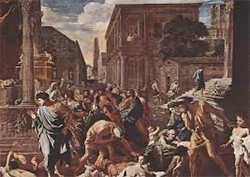Lucius Verus: Co-emperor of Rome
Lucius Verus was co-emperor of Rome for a time in the 2nd Century. He is perhaps most well-known for being a suspected victim of a vicious plague. 
He was born on Dec. 15, 130, in Rome. His name at birth was Lucius Ceionius Commodus. His father, Lucius Aeilus Caesar, died when the boy was 7. Lucius Aeilus had been the choice of then-Emperor Hadrian to be his successor. When the father died, the son became the successor to Hadrian's next dedicated successor, Antoninus Pius. The only stipulation was that Antoninus also name as his successor Marcus Aurelius, Hadrian's nephew by marriage. This set up the possibility of co-emperors. The last part of this arrangement was that Antoninus promise to have his daughter, Faustina, marry young Lucius. Still a boy, Lucius was aware of such arrangements but gave himself over to his studies. He had a quality education, learning Greek and Latin and making a special study of oratory, philosophy, and poetry. Hadrian died in 138, and Antoninus took the throne. The new emperor changed the marriage arrangements slightly, betrothing his daughter instead to Marcus Aurelius, who was nine years older than Lucius.  Lucius served as quaestor in 153 and then twice served as consul, in 154 and 161; in that last year, his co-consul was Marcus. Emperor Antoninus Pius died in that same year, and Lucius and Marcus became co-emperors. (Technically, Marcus was emperor first and then asked the Senate to bestow on Lucius the status of co-emperor; Lucius, in turn, took Marcus's family name, Verus, as his own.) Unlike the relative peaceful nature of their predecessor's reign, the "brothers" presided over a period of upheaval, both in warfare and in domestic strife. Lucius went east to fight against the Parthian king Vologases IV, who had brazenly replace the Roman governor of Armenia with someone more to his liking and then defeated Roman forces led by the Roman governors of two other provinces, Cappadocia and Syria. Lucius was ostensibly in charge of the army, but he didn't do much of the fighting. Rome prevailed, however, destroying the Armenia capital city of Artaxata and then, in 166, capturing the strongholds of Ctesiphon, in the process razing the royal palace. 
Lucius and the army headed back to Rome, unwittingly bringing with them a devastating disease. The so-called Antonine Plague originated in Mesopotamia and ripped through Asia Minor, Greece, and Italy, claiming what many historians estimate was 10 percent of the Empire's population. Later reports termed the plague smallpox, based on descriptions of the symptoms. Lucius himself might have fallen victim to the plague. He became seriously ill on his way from Aquileia to Rome and died, in 169. He had married Marcus's daughter Anna Lucilla, in 164; they had three children, all of whom died young. |
|
Social Studies for Kids
copyright 2002–2026
David White




